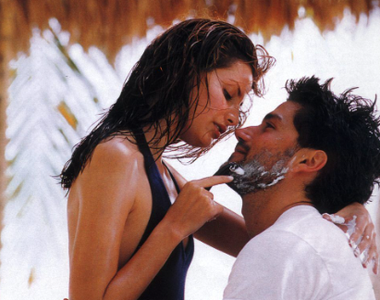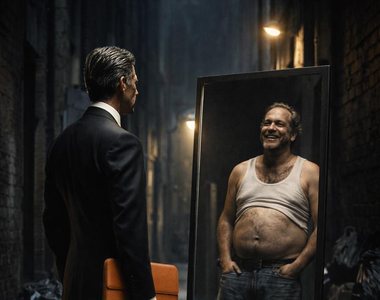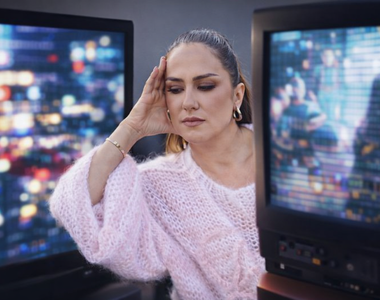
Ai ishte i paduruar, sytë i rrëzëllinin dhe lëkura i shkëlqente nga djersa.
“Më ndihmo,” më tha. “Më kanë mallkuar.”
Në fillim, vinte re vetëm drita që ndizeshin dhe fikeshin vetiu. Më pas, një figurë, në cep të syrit. Tani, diçka i prekte gishtat dhe i përkëdhelte krahun. Gjendja po përkeqësohej.
“Isha te një prift katolik,” tha burri. “Por ai s’më ndihmoi dot. Më ndihmon dot ti?”
Po, mundesha. E dija shumë mirë ç’duhej të bënte.
Unë kam qenë fallxhore. Çdo të dielë, ngjisja shkallët e një shtëpie të vjetër në Sidney, ulesha në papafingo dhe shihja të ardhmen. Lexoja letra Tarot dhe interpretoja horoskope.
Kur isha adoleshente, lexova një libër të titulluar Positive Magic. Një manual për shtrigat, ku në thelb ishte ideja se nëse do diçka dhe ke synime të pastra, thjesht ia thoje universit dhe dëshira do të të plotësohej. Edhe pse asnjë nga gjërat që doja unë (famë, pasuri, një të dashur) nuk erdhën kurrë, gjërat pasuan njëra-tjetrën dhe mësova si të lexoja letra Tarot. Asokohe, studioja për shkencë dhe letrat ishin diçka argëtuese në festa.
Gjithçka ndryshoi kur gjatë një pushimi dreke, i lexova letrat një kolegeje. Ajo zgjodhi letrën e shtatzënisë, që na bëri për të qeshur se ajo planifikonte prej kohësh të hiqte vezoret.
Një javë më vonë, më tha: “Gjeje çfarë më tha doktori sot në mëngjes?”
Ishte shtatzënë dhe unë isha zyrtarisht fallxhore.
Ngaqë doja ta përmirësoja talentin tim, u futa në një kurs për fallxhore ku mësova të thoja gjënë e parë që më vinte ndërmend. “Mendimet e para janë më telepatiket, aty s’ka ende efekt mendja racionale,” tha mësuesja.
Gjithashtu mësova që gjërat janë të lidhura dhe që çdo gjë është simbol për diçka tjetër. Papritur, shihja shenja dhe paralajmërime kudo.
Për të testuar aftësitë e mia, dola vullnetare për të lexuar fatin e kongregacionit të një kishe. Ata më linin një lule në tavolinë dhe unë zgjidhja dhe e lexoja fatin e lules në mikrofon. Nervoze, zgjodha një lule të mbështjellë në letër alumini. Petalet ishin rrudhur dhe shtypur. S’ndjeva asgjë, kështu që përshkrova simbolizmin.
“Ndihesh e dhunuar dhe e dërrmuar,” thashë.
Më pas, një grua më foli dhe më tha se ishte viktimë e dhunës në familje. Më pyeti çfarë duhej të bënte.
Isha vetëm 19 vjeçe dhe s’dija ç’t’i thoja, por reputacioni im mori dhenë.
Universi më tha që s’më jepej për shkencë përmes rezultateve të vitit të dytë. Hoqa dorë nga shkolla dhe iu futa teatrit. Gjithashtu, u regjistrova për një kurs një vjeçar në Qendrën Astrologjike të Sydney.
Kursi nisi me kuptimet e zodiakut, duke nisur nga Dashi e deri te Ujori. Më pas të shkëlqyeshmit; dielli (çfarë bëhesh), hëna (çfarë sjell në jetë) dhe planetet. Më pas, mësuam si të llogarisnim pozicionet planetare dhe të parashikonim horoskopet.
Edhe pse astrologët përdorin të dhënat e Nasa-s për përllogaritjet e tyre, horoskopi nuk është një hartë e parajsës. Babilonët, që shpikën astrologjinë, besonin se dielli rrotullohej rreth Tokës; astrologët modernë përdorin ende grafikë ku në qendër është Toka, a thua se Koperniku s’ekzistoi kurrë. Ky është vetëm një nga problemet e kësaj fushe.
Kuptimet astrologjike derivojnë nga një parim që quhet magjia simpatetike, ku gjërat që ngjajnë lidhen me njëra-tjetrën. Marsi duket i kuq, kështu që sundon gjërat e kuqe, si gjaku. Si mund të marrësh gjak? Duke prerë dhe vrarë, kështu që Marsi sundon mjekësinë dhe luftën.
Parashikimet bëhen duke kombinuar kuptimet me lëvizjet e planeteve. E zëmë, Saturni, planeti i kufizimeve do të hyjë në shtëpinë e parë të vetes – jeta jote do të kufizohet. Do të kesh më shumë përgjegjësi se më parë. Ose do t’ju ndalojnë të merrni më shumë përgjegjësi. Ndoshta do të njiheni me një njeri të ftohtë dhe kritik. Sidoqoftë, është momenti i duhur për të nisur një dietë.
Astrologjia është një lojë gjigante.
E adhuroja, edhe pse po më humbiste interesi për praktika të tjera mistike. Pjesërisht, s’kisha kohë sepse punoja në teatër dhe në një spital katolik si stenografe.
Më në fund, më pranuan në një degë muzike dhe ditët e mia u mbushën me leksione dhe netët u mbushën me prova. S’kisha më para në duar sepse mund të punoja vetëm gjatë ditëve të festave. Kur pashë një njoftim se kërkohej një fallxhore, aplikova me vrap.
Aftësitë e mia i bënë përshtypje burrit në banak dhe u punësova.
Kërkonim 50 dollarë për një orë, një shumë goxha e lartë për kohën dhe unë doja të ofroja një shërbim cilësor. Printoja horoskopin dhe shtroja letrat dhe nisja të interpretoja menjëherë, pa kërkuar shenja nga klienti.
Shumicën e rasteve nuk thoja asnjë fjalë. Mesa duket, njerëzit thjesht duan të shfryhen për një orë te dikush që s’i njeh.
Problemet që hasja nga njerëzit që mund të përballonin një fallxhore që kërkon 50 dollarë në orë ishin të limituara: probleme në dashuri, në punë, me ndryshimin. I kisha dëgjuar aq shpesh këto histori sa mund ta gjeja problemin e një klienti në momentin që hynte në derë. Djem të rinj zemërthyer mendonin se ishte më e thjeshtë të flisnin me një fallxhore sesa me shoqërinë. Një herë i thashë një djaloshi, “Mos u kthe me atë vajzën. Nuk ia vlen,” në momentin që hyri. Shoku i tij ra nga shkallët nga mahnitja.
Gjithashtu mësova se inteligjenca dhe arsimi nuk të mbrojnë nga supersticioni. Kisha plot klientë që punonin në bursë, në marketing, politikanë, që merreshin me çështje të paparashikueshme.
Pasiguria i çon njerëzit drejt astrologjisë, jo injoranca, prandaj s’habitem nga gjithë 20 e ca vjeçarët që besojnë në horoskop. U rritën me Harry Potter dhe kur u diplomuan, ekonomia ishte më e brishtë se kurrë. Prandaj janë klientët idealë.
Magjia u zbeh kur dëgjoja njerëz që besonin me shpirt në aftësitë e mia. Disa klientë të vjetër betoheshin se kisha bërë parashikime të sakta deri në detaj, që s’ishte aspak e vërtetë. Kuptova që parashikimet e mia ishin në bashkëpunim me klientin. Unë thurja një histori dhe më vonë, kujtesa e klientit shtonte elementë të rinj. E testova këtë teori me një mikeshë, që më mburri një fallxhore që kishte vizituar. E kishte regjistruar takimin dhe unë i kërkova ta dëgjoja.
Fallxhorja s’kishte thënë asnjë nga gjërat që shoqja ime pretendoi të kishte thënë. Asnjë. Gjithë punën e kishte bërë imagjinata e saj.
Sidoqoftë, ndonjëherë jam tejet e saktë. Një të dielë, shkova në një festë direkt sa dola nga puna. Një studente atje tha se s’dinte çfarë dege të ndiqte – fotografi, dizajn grafik apo dizajn industrial?
“Vazhdo për fotografi,” i thashë unë.
Më pa me sy të habitur. “Nga e dije?” më pyeti dhe shpjegoi se fotografia ishte pasioni i saj më i madh në jetë, por prindërit s’e lejonin.
Nuk mund t’i thoja, “sepse kam tre sy,” kështu që reflektoa për një moment. Aty më goditi. “Tingëllove më e lumtur kur the ‘fotografi’,” i thashë. Mësuesja ime kishte të drejtë – sinjalet që kapim para se të hyjë në punë vetëdija janë të sakta.
Ndoshta s’kisha aftësi të mbinatyrshme, por kjo s’ka rëndësi. Ishte thjesht argëtim, në fund të fundit. Deri kur më takoi burri i mallkuar. Ai që kishte shkuar te një prift katolik.
“Shko në spital,” i thashë. “Tani.”
Atë javë, kisha shtypur letra për një neurolog të specializuar në sëmundjet e trurit. Disa nga letrat përshkruanin simptoma si ato të burrit përpara meje.
“Po më quan të çmendur?” tha ai, me dorën grusht.
“Jo,” i thashë. “Por priftërinjtë katolikë janë shumë të zotët. Nëse s’të ndihmoi dot ai, s’ke të bësh me një mallkim.”
Këtu u nevrikos më shumë.
“Je mashtruese!” më bërtiti dhe zbriti poshtë për të kërkuar mbrapsh paratë.
Ky takim më tronditi. Pak kohë më vonë, mblodha librat dhe letrat e hoqa dorë.
Nga rasti në rast, mund të parashikoj diçka. Ja një: Kapitali që po investohet për aplikacionet e astrologjisë do të ndërtojë një sistem parashikues jashtëzakonisht të saktë sepse njerëzit janë të parashikueshëm. Teksa njerëzit ndjekin këshillat, aftësitë parashikuese të aplikacionit do të intensifikohen, duke krijuar kështu një lak të ngushtë elektronik. Por do të jetë shumë popullor – nëse e shet bukur, njerëzit do e blejnë.
Nga Felicity Carter për The Guardian







